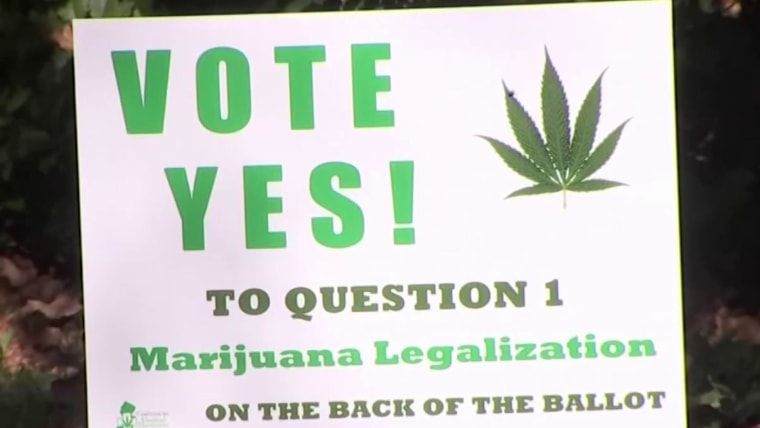After voting overwhelmingly last year to decriminalize cannabis at the federal level, congressional leaders reintroduced a bill Friday to strike marijuana from the list of controlled substances and invest in communities disproportionately affected by the so-called drug war.
The Marijuana Opportunity Reinvestment and Expungement Act of 2021, also known as the MORE Act, would also eliminate criminal penalties, clear criminal records and create social equity programs focused on repairing damage to individuals and communities impacted by decades of prohibition.
The bill was introduced by House Judiciary Committee Chairman Jerry Nadler, D-N.Y.
"Since I introduced the MORE Act last Congress, numerous states across the nation, including my home state of New York, have moved to legalize marijuana," Nadler said in a statement. "Our federal laws must keep up with this pace."
The bill failed to advance last year in the Senate, where a companion bill also died. A second Senate bill is expected to be introduced later this year with the backing of Senate Majority Leader Chuck Schumer, D-N.Y., and Sens. Cory Booker, D-N.J., and Ron Wyden, D-Ore.
The revised bill contains stronger social justice measures intended to address the generational effects of prohibition, including removing language that would have denied business licenses to applicants with felony convictions.
It would set a 5 percent tax on cannabis retail sales that would increase to 8 percent over three years. Revenue would go to the Opportunity Trust Fund, which would pay for job training, re-entry services, legal aid and health education programs for impacted communities.
It also would create an Office of Cannabis Justice to oversee social equity components, prevent the federal government from penalizing cannabis users who depend on social services and open the door to more research opportunities.
The Small Business Administration would establish the Cannabis Restorative Opportunity Program to help businesses owned and operated by “socially and economically disadvantaged individuals.” The SBA mandate would develop and implement equitable cannabis licensing programs that minimize barriers for people adversely impacted by the drug war.
“The whole intention and vision behind this bill is that it would repair past harms of drug prohibition,” said Maritza Perez, national affairs director at the Drug Policy Alliance, a nonprofit working to reform drug laws. “We’re hoping that another successful House vote would continue to pile on momentum.”
Despite the move toward decriminalization, people of color continue to be most affected by existing drug laws. According to a 2020 report by the American Civil Liberties Union, a Black person is 3 times more likely to be arrested for cannabis possession than a white person. The ACLU estimated that enforcing cannabis prohibition laws costs taxpayers approximately $3.6 billion a year.
“This bill will give a lot of individuals a fresh start,” said Stuart Titus, CEO of cannabis company Medical Marijuana Inc.
But it could take a “herculean effort” to advance cannabis legislation, Titus said, adding that Democrats will need to pick up more Republican support if they intend to end prohibition.
December’s vote was the first time a full chamber of Congress took up the issue of federally decriminalizing cannabis. Of the vote count, 222 Democrats were in favor of passing the MORE Act and six were against it. Five Republicans voted in favor of it and 158 voted against passing it.
“This has historic implications,” Titus said. “We have an entire industry here ready to boom.”
In 2020, legal cannabis sales totaled $20 million and are projected to more than double by 2025, according to the bill.
For nearly a decade, the federal government has relied on an uneasy truce with states that chose to carve their own cannabis laws. Currently 17 states, two territories and Washington, D.C., have legalized recreational cannabis and 36 states and two territories allow medical marijuana.
The tension between state and federal law has contributed to confusion over what rights cannabis users have to buy and use marijuana.
Narmin Jarrous, chief development officer for Exclusive Brands, a cannabis company based in Michigan, said her primary care doctor recently dropped her after she tested positive for marijuana. Jarrous lives with chronic pain caused by endometriosis and prefers marijuana to harsher pain management medications, such as Vicodin and oxycodone.
“If it’s happening to me, I know it’s happening to [other] patients,” she said. “It was such an absurd policy, in my opinion, and it just shows how much work we have to do as a society.”
"social" - Google News
May 29, 2021 at 04:44AM
https://ift.tt/3p7edwf
House reintroduces bill to decriminalize cannabis, create social equity programs - NBC News
"social" - Google News
https://ift.tt/38fmaXp
https://ift.tt/2WhuDnP
Bagikan Berita Ini















0 Response to "House reintroduces bill to decriminalize cannabis, create social equity programs - NBC News"
Post a Comment